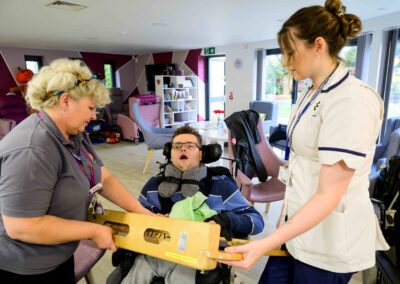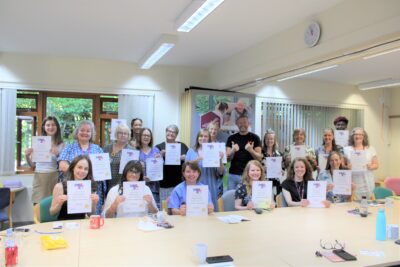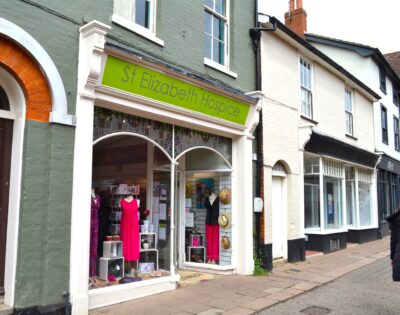Hospice hosts second panel discussion event – creative expressions
As a hospice, we play a vital part in using creative expression for our patients and their families, to access emotions that perhaps they have not been able to express or to process.
To work through senses of loss, grief, anger or shock, or equally perhaps of hope, faith, gratitude, courage, love and joy. We are able to offer creative expression through Art and music therapy. But this use of creativity as a form of therapy and to enhance wellbeing is not restricted to the context of end of life care. St Elizabeth Hospice invites you to a panel discussion to look at the role creativity plays for us all to communicate and make sense of the world.
Creative Expression
A powerful contribution to health and wellbeing
Thursday 25 April from 6pm
at Seckford Theatre, Burkitt Road, Woodbridge, IP12 4JH
RSVP to karina.wood@stelizabethhospice.org.uk
The panel includes:
Clare Best
Clare Best has worked with books all her life – as a fine bookbinder, a bookseller, an editor and for the past eighteen years as a writer who often collaborates with visual artists.

Her ground breaking multimedia project Breastless – a combination of poetry, prose, photography, film and plaster-casts – is based on her experience of family breast cancer and risk-reducing bilateral mastectomy. She has performed this work across the UK and Ireland as well as in Canada and the USA.
Her most recent book is a prose memoir, The Missing List, which creatively explores the process of remembering traumatic childhood abuse and working towards healing. Artist Neil Gower writes ‘Clare describes the book as an “act of compassion for my young self”. She relies on her journal, her reflections, transcribed recordings of her father’s account of his life, and his Bolex ciné-films. What beguiled me immediately was the forensic beauty of the writing. The whole thing is composed with the ear of a poet and the eye of a detective but, crucially, never the voice of a victim. The power of the book lies in its quiet determination to make sense of the unspeakable.’ Clare recently moved from Sussex and now lives with her family and their whippet near the Suffolk coast.
Phillipa Reive – Director, Creative Campus (Snape Maltings)
Phillipa Reive has worked at Snape Maltings since 1999. Under her leadership, the learning and inclusion department became an award winning year round programme, delivering high quality music projects with an increasingly important contribution to the health and wellbeing agenda.

Phillipa is now director, creative campus, working on Snape Maltings’ future role as a point of focus and innovation for musicians, researchers and communities interested in advancing the positive impacts of music in society.
Phillipa studied at Liverpool University and Bath College of Higher Education. After teaching music in a large comprehensive school in Liverpool she went on to work at the Royal Liverpool Philharmonic and Glyndebourne Productions.
Katherine Grogan
Katherine Grogan qualified as a music therapist in 1993. She has worked as a music therapist in many settings including schools, services for adults with learning disabilities, The National Autistic Society, Child and Adolescent Mental Health Services and hospices. She is also a UKCP registered psychotherapeutic counsellor and a systemic practitioner.
Katherine currently leads the emotional wellbeing team at St Elizabeth Hospice.
Lucy Walker
Lucy Walker is an archaeologist and landscape historian interested in engaging with people about social and cultural issues to do with heritage.

She uses archaeology, landscape, history and museum collections to provoke responses to contemporary issues and works with artists, musicians, writers, scientists and community groups to create innovative and imaginative projects, reaching out to new audiences.
Lucy lives in Cambridge and is a trustee of the Museum of Cambridge, a former city councillor and a school governor. She is an Affiliated Scholar at the McDonald Institute for Archaeological Research, University of Cambridge, and team member of ArchaeoLink, an organisation set up to enable communities to benefit from their archaeology and historic landscapes. As a Think Tank Associate Lucy works with Robert Pacitti on The Art + Science of Living + Dying.
Robert Pacitti
Robert Pacitti is an artist, curator and artistic director of the SPILL Festival of Performance. Initially trained as a fine art painter, he began making live performance and experimental theatre in 1988.

For over 20 years he created and toured an award winning body of group and solo experimental performance works worldwide with Pacitti Company. In 2012 he premiered his first feature film On Landguard Point, staring 1000 non-professional performers from across the east of England. He now works out of Ipswich, where he creates the SPILL Festival and runs the Think Tank – a specially renovated building for private and public research into contemporary performance and associated areas. pacitticompany.com + spillfestival.com



